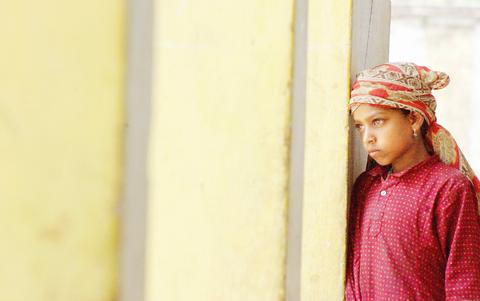Pakistani President Pervez Mush-arraf yesterday reiterated an offer to hold "unconditional" talks with India's prime minister to resolve the tense military standoff between the two nuclear-armed rivals.
But Indian leader Atal Behari Vajpayee, demanding an end to cross-border raids by Islamic militants, has so far ruled out a face-to-face meeting during a 16-nation Asian summit in Kazakhstan.

PHOTO: AP
India and Pakistan have massed about a million troops along their border since a December attack on the Indian parliament which New Delhi blames on Pakistan-based militants fighting its rule in divided Kashmir.
Tensions flared again after militants raided an Indian army camp in Kashmir on May 14, killing more than 30 people.
Musharraf has said he has proposed meeting Vajpayee several times without success. Vajpayee told reporters before leaving India for Kazakhstan: "There is no such plan."
Asked at a news briefing yesterday under what conditions he would be willing to talk to Vajpayee, the Pakistan military ruler replied: "Unconditional. You need to ask that question to Prime Minister Vajpayee. I have no conditions."
Russian President Vladimir Putin hopes to bring them together to end a confrontation the international community fears could set off a nuclear war.
Musharraf has pledged to crack down on cross-border raids, but India says it wants proof, not words.
In the Ukrainian capital Kiev, UN Secretary-General Kofi Annan told a news conference: "I hope the opportunity that the meeting in Almaty has offered will be used wisely and that the discussions will take us away from the brink."
Asked earlier, before talks with Kazakh President Nursultan Nazarbayev, if there was a risk of another war breaking out over Kashmir, Musharraf replied curtly: "I hope not."
Putin and Chinese President Jiang Zemin (
Fresh tension erupted yesterday as officials said a Pakistani soldier was killed when the two sides exchanged heavy mortar, machine-gun and small-arms fire.
Russia and China's attempts at conciliation are part of intense diplomatic activity to calm tensions that the US fears could derail its efforts to pursue its war on terror in the wake of Sept. 11 attacks on the US.
Russia has strong economic ties with India, selling it fighter aircraft, battle tanks and other military equipment, while China has been closer to Pakistan.
After meeting Nazarbayev yesterday, Vajpayee blamed regional tension on "border terrorism," but made no direct mention of Pakistan.
"Of course we discussed the tension in South Asia created by border terrorism," Vajpayee said. He spoke in Hindi, with his remarks translated into Russian.
"I am glad that tomorrow's summit will also produce a joint declaration condemning international terrorism. ... We have expressed our hopes that those elements who believe in terrorism and religious extremism should not be indulged and their number should not be allowed to grow," he said.
Russia criticized Pakistan's recent series of missile tests.
"Against the background of the conflict [with India], Pakistan's testing of nuclear rockets was a provocative gesture," Interfax news agency quoted Russian Defense Minister Sergei Ivanov as saying.
Altogether 16 nations are taking part in the three-day Conference on Interaction and Confidence-building Measures in Asia. The group includes Russia, China, Afghanistan, Israel, Iran, Turkey and the Palestinians. The US, Australia and Japan have observer status.

SECURITY: As China is ‘reshaping’ Hong Kong’s population, Taiwan must raise the eligibility threshold for applications from Hong Kongers, Chiu Chui-cheng said When Hong Kong and Macau citizens apply for residency in Taiwan, it would be under a new category that includes a “national security observation period,” Mainland Affairs Council (MAC) Minister Chiu Chui-cheng (邱垂正) said yesterday. President William Lai (賴清德) on March 13 announced 17 strategies to counter China’s aggression toward Taiwan, including incorporating national security considerations into the review process for residency applications from Hong Kong and Macau citizens. The situation in Hong Kong is constantly changing, Chiu said to media yesterday on the sidelines of the Taipei Technology Run hosted by the Taipei Neihu Technology Park Development Association. With

CARROT AND STICK: While unrelenting in its military threats, China attracted nearly 40,000 Taiwanese to over 400 business events last year Nearly 40,000 Taiwanese last year joined industry events in China, such as conferences and trade fairs, supported by the Chinese government, a study showed yesterday, as Beijing ramps up a charm offensive toward Taipei alongside military pressure. China has long taken a carrot-and-stick approach to Taiwan, threatening it with the prospect of military action while reaching out to those it believes are amenable to Beijing’s point of view. Taiwanese security officials are wary of what they see as Beijing’s influence campaigns to sway public opinion after Taipei and Beijing gradually resumed travel links halted by the COVID-19 pandemic, but the scale of

A US Marine Corps regiment equipped with Naval Strike Missiles (NSM) is set to participate in the upcoming Balikatan 25 exercise in the Luzon Strait, marking the system’s first-ever deployment in the Philippines. US and Philippine officials have separately confirmed that the Navy Marine Expeditionary Ship Interdiction System (NMESIS) — the mobile launch platform for the Naval Strike Missile — would take part in the joint exercise. The missiles are being deployed to “a strategic first island chain chokepoint” in the waters between Taiwan proper and the Philippines, US-based Naval News reported. “The Luzon Strait and Bashi Channel represent a critical access

Pope Francis is be laid to rest on Saturday after lying in state for three days in St Peter’s Basilica, where the faithful are expected to flock to pay their respects to history’s first Latin American pontiff. The cardinals met yesterday in the Vatican’s synod hall to chart the next steps before a conclave begins to choose Francis’ successor, as condolences poured in from around the world. According to current norms, the conclave must begin between May 5 and 10. The cardinals set the funeral for Saturday at 10am in St Peter’s Square, to be celebrated by the dean of the College